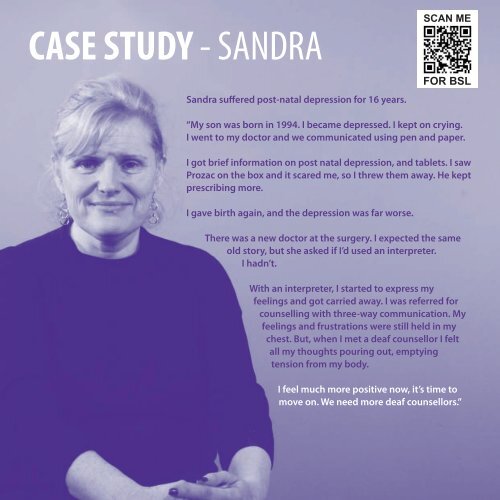Sick-Of-It-Report
Sick-Of-It-Report
Sick-Of-It-Report
Create successful ePaper yourself
Turn your PDF publications into a flip-book with our unique Google optimized e-Paper software.
CASE STUDY - SANDRASCAN MEFOREWORDSCAN MESandra suffered post-natal depression for 16 years.“My son was born in 1994. I became depressed. I kept on crying.I went to my doctor and we communicated using pen and paper.I got brief information on post natal depression, and tablets. I sawProzac on the box and it scared me, so I threw them away. He keptprescribing more.I gave birth again, and the depression was far worse.FOR BSLThere was a new doctor at the surgery. I expected the sameold story, but she asked if I’d used an interpreter.I hadn’t.With an interpreter, I started to express myfeelings and got carried away. I was referred forcounselling with three-way communication. Myfeelings and frustrations were still held in mychest. But, when I met a deaf counsellor I feltall my thoughts pouring out, emptyingtension from my body.I feel much more positive now, it’s time tomove on. We need more deaf counsellors.”This report shouldbe enthusiasticallywelcomed by theDeaf community andeveryone who worksin healthcare. <strong>It</strong>’s thefirst time we’ve everhad such valuableinformation on thehealth of Deaf people.<strong>It</strong> really is long overdue.I hope this report makes us all think carefullyabout what we can each do to end the unfairnessand injustice. The research makes it clear that thereis a lot to learn, and plenty to do.The really good news is that the recommendationsare simple steps which anyone can take. <strong>It</strong> just needsthe health service to think about the needs of allpatients, Deaf as well as hearing.I’m only here because SignHealth and othersare already working to make things better. TheirInterpreterNow online service helped to save my life.My full story is on page 7.Deaf people will help to make it easy. We are theexperts in the best way to communicate with deafpeople, and we know what needs to be done.This research shows that as Deaf people we faceeveryday barriers that the wider community simplywouldn’t put up with. Can you imagine forcinghearing people to walk to their GP’s surgery to bookan appointment? Can you imagine them having toexplain their problems to a doctor who does notunderstand English, and who replies in anotherlanguage?The government and the NHS are already planningsome changes which will benefit Deaf patients, butit’s not enough and it’s too slow. Online bookingfor appointments is a good example. <strong>It</strong> will be ahuge help, but the deadline for doctors to makeit happen has been delayed for years.As the report points out, easier access is animportant starting point, but it is not enough.Everyone involved in health care, from governmentand commissioners to doctors and nurses, needs towork with organisations such as SignHealth to findother ways to reduce these health inequalities.Getting services right for Deaf people will be abig step towards making the health service fit foreveryone. The changes we’re talking about areimportant ... and I know that more than most.AndrewDeaf PatientFOR BSL


